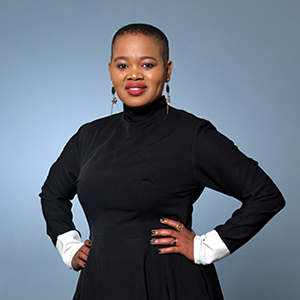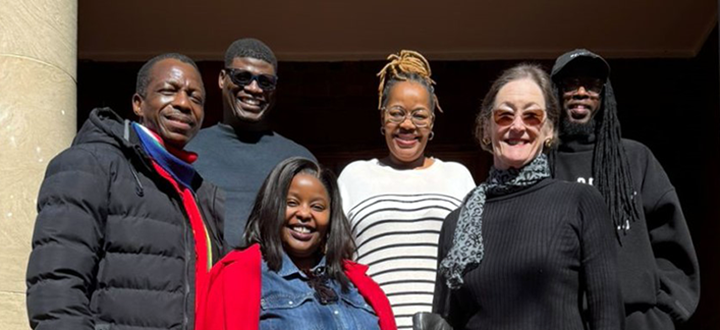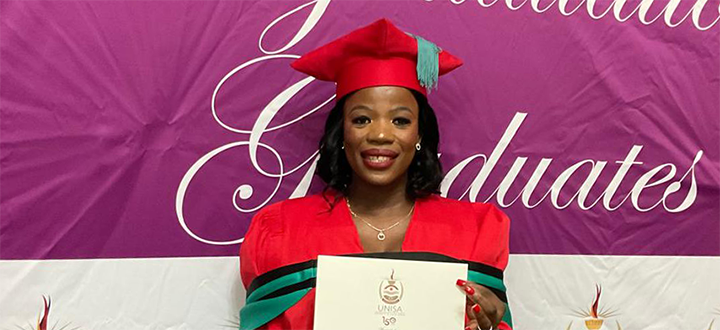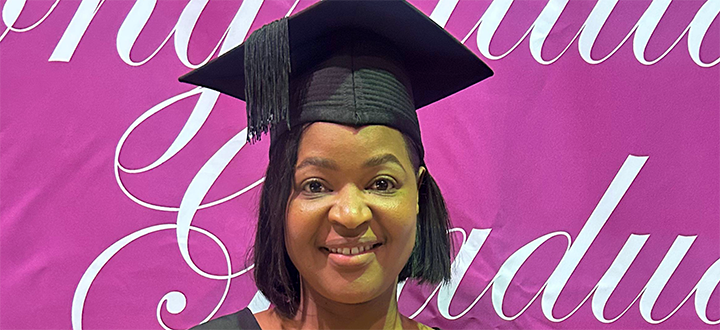Research
Advocating for multimedia use for teaching and learning in ODeL institutions
The rapid improvement of Information and Communications Technology (ICT) in the 21st century has enabled users to easily connect to social networks, work from home and have access to quality higher education.
To improve the quality, accessibility and cost efficiency of Open Distance and e-Learning (ODeL) education, Dr Khanyisile Twabu investigated how Higher Education Institutions (HEIs) globally require support to create, develop and upgrade all multimedia technologies and ICT infrastructure to improve ODeL teaching and learning post-Covid-19 through her PhD thesis.

Dr Khanyisile Twabu
This came after determining how screencasts as a technology, an enhanced teaching and learning tool, could be used in ODL in her master's dissertation.
Her research focuses on multimedia and online education and stems from an advocacy point of view, primarily to showcase the significant role of multimedia in the delivery of instruction.
As a multimedia design and production professional keen to understand the core business of an ODeL institution of higher learning, it was natural for Twabu to conduct research on curriculum development.
"I was interested in understanding how curriculum development and design work so that I can incorporate my visual background with instructional design in education by ensuring that the deliverable is viable to stakeholders," she said.
She uses multimedia (text, images, videos and sound shared through various technologies such as computers, the internet and social media) to enhance the academic project for academics.
"I was trying to show how important it is to use multimedia, an element which became evident (a reality) during the Covid-19 pandemic," she reflected. "With limited physical interaction, teaching and learning continued online," she continued.
A post-Covid-19 multimedia framework
According to Twabu, HEIs faced numerous challenges that provided opportunities for change during the pandemic.
Through her research findings and recommendations, she hopes to achieve a sense of accountability from the management of higher learning institutions (ie DHET) for policies to be reviewed and amended to fit the purpose.
Twabu says HEIs with registered students across the global competency level require reliable, stable and the latest ICT infrastructure to function globally in all seasons (ie the peak examination season).
She further recommends that HEIs invest in ICT upgrades and procure appropriate tools of trade.
For staff upskilling in multimedia and ICT aid, Twabu's study recommends that lecturers be upskilled to enable the development of activities such as simulations, gamification and state-of-the-art gaming labs that academics can use to explore the integration of gaming for learning.
In looking at the student-centric approach, her study recommends that HEIs commit to reaching out to students across regions with high-performing ICT infrastructure and connectivity, supplying digital devices, data and zero-rated website access.
"If anything, Covid-19 has taught us that we need to apply change management, change our thinking and change our policies around the multimedia and ICT upgrades," she said.
As a result of the world's changing remote communication, the study recommends that HEIs reconsider their curriculum design policy, effectively proposing and amending its multimedia framework components.
The study recommends the adaption of this multimedia framework to DHET policies post-Covid-19.
To whom much is given, much is required
After spending years in advertising, Twabu joined Unisa as an e-learning facilitator/multimedia compiler in August 2010. In June 2019, she was afforded an opportunity to act as the Deputy Director for the Multimedia Centre until September 2023.
"The deputy director acting position made me realise that I needed to add value or enhance it by upscaling my knowledge because they say to whom much is given, much is required."
During her PhD studies, Twabu received research support services from the Department of Research, Innovation and Commercialisation. She was funded as a Professional Research Group researcher for her thesis' editing. She attended a workshop to write for popular media where she produced an article for The Conversation Africa.
Although the Professional Research Committee approved nine months' Research Development Leave, she could not take it due to the demanding workload. During the day, she would meet professional demands; in the evening, she would burn the midnight oil on academic work.
Even in what might seem like a limited time, Twabu says, "I was always intentional in trying to make time for my family members."
Eager to propel the use of ICT in education, Twabu began a new role as acting Deputy Director in the Directorate: Academy Applied Technology and Innovation at Unisa's ICT Department in October 2023. Together with a team, they conduct research and develop and deploy innovative technology solutions for teaching, learning and student support by turning ideas into value-generating digital solutions.
* By Mpho Moloele, PR and Communications, Department of Research, Innovation and Commercialisation
Publish date: 2024-04-02 00:00:00.0


 A giant leap for student success and retention
A giant leap for student success and retention
 SWEEP: Where women entrepreneurs take the lead
SWEEP: Where women entrepreneurs take the lead
 A sense of belonging and excellence nurtured through collaboration
A sense of belonging and excellence nurtured through collaboration
 Wielding her Unisa PhD, Botswana educator champions early childhood development
Wielding her Unisa PhD, Botswana educator champions early childhood development
 Proud Unisa alumna bridges distance and fuels career growth
Proud Unisa alumna bridges distance and fuels career growth